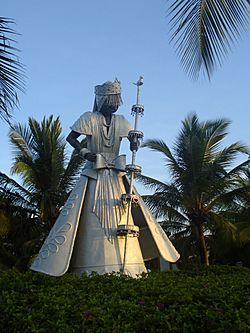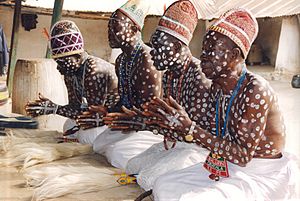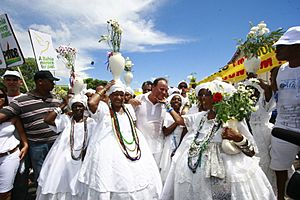Ọbatala facts for kids
Quick facts for kids Ọbatala |
|
|---|---|
| Creation (especially humans) and the sky | |
| Member of Orisha | |

Statue of Obatala in Costa do Sauípe, Bahía
|
|
| Other names | Obatala or Obatalá; (obataasha)Ochala or Oxalá; and Orichalá or Orixalá |
| Venerated in | Yoruba religion |
| Color | White |
| Region | Yorubaland, Latin America |
| Ethnic group | Yoruba |
| Personal information | |
| Spouse | Yemowo (Ile-Ife, modern-day Nigeria); Yemaya (Americas) |
Obatala is an important orisha (a spirit or deity) in the Yoruba religion. According to Yoruba myths, Obatala was first given the job to create the Earth. However, he didn't finish this task, and his younger brother Oduduwa completed it instead.
Because of this, Obatala was then given the job of creating human beings. His father, Olodumare (the supreme being), approved this task. This is why Obatala is sometimes called the "sculptor of mankind."
Yoruba myths also say that Obatala decided the skin color of humans after he shaped them.
- Those he "fairly burnt" became people with lighter skin (Europeans).
- Those he "forgot in the fire" became people with darker skin (Africans).
- Those he "forgot to burn" became people with albinism (very pale skin and hair).
Obatala worked on creating humans using water and clay. But during this process, he drank too much palm wine. This caused him to accidentally create human beings with disabilities. When he realized his mistake, he promised never to drink again. He then became known as The Great White God, who protects people with disabilities. Because of this, he was given power over all human beings.
In the ancient city of Ife, there was also a human king named Obatala. He was the founder and ruler of Ife during its early times. His rule was challenged by Oduduwa. However, King Obatala won this challenge and got his throne back. Later, this human king Obatala was honored as a god and became part of the Yoruba pantheon, merging with the older deity of the same name.
Contents
Obatala's Story
According to Yoruba stories, Obatala is one of the oldest orishas. He was first given the power to create the Earth. He took a special bag from Olodumare to help him. He used it to create land on the ancient ocean. However, Oduduwa finished the job, and Olodumare gave him the title "God of the Earth."
Obatala was then given the task to create humans. He took a long gold chain, a snail's shell filled with sand, a white hen, a black cat, and a palm nut. He climbed down the chain to the new land.
He let the white hen go, and it spread the sand from the shell onto the ocean. This created mountains and valleys. He also planted the palm nut, which grew into a forest.
After he was happy with the land, he began to shape human beings from clay. While he was working, he drank palm wine from the new forest. This made him create some figures that were not perfect.
When he understood what he had done, he promised to protect all people with disabilities.
After he successfully created the human figures, they were given ase (life force), a copper knife, and a wooden hoe. With these, they were able to live and grow.
Obatala in Africa
Ancient Obatala
In the Yoruba religion, Obatala is seen as one of the oldest orishas. He was given the power to create the Earth. One story says that before he could report back to Olodumare, Oduduwa took over his job. Oduduwa used the special bag from Olodumare to create land on the ocean. This led to a big disagreement between the two. However, many Yoruba traditions say that different gods helped create the world. This shows that the beginning of the world is a story connected to many deities, not just Obatala or Oduduwa.
King Obatala
King Obatala was the founder and ruler of Ile-Ife. He was known as Olufe, meaning "King of Ife." His rule was interrupted when Oduduwa and his supporters tried to take over. But Obatala, with the help of his own supporters, was able to defeat Oduduwa and get his throne back.
This event is celebrated every year in the Obatala festival in Ife. The crowning ceremonies of the Ooni (the traditional ruler of Ife) also show that Obatala owned the crown, throne, and power. After the conflict, Obatala's family and the family of Obalufon Ogbogbodinrin (Obamakin) took turns ruling. This continued until a new ruler, Lajamisan, changed the system.
Obatala in the Americas
Santería
In Santería, a religion practiced in the Americas, Obatalá (also called Ochalá or Oxalá) is the oldest "orisha funfun" (white deity). "White" here means purity and the "light" of understanding. In Santería, Obatalá is often linked with Our Lady of Mercy and Jesus Of Nazareth. It is believed that Obatalá has many different forms, both male and female.
Candomblé
In Candomblé, another religion from the Americas, Oxalá (Obatalá) is connected with Our Lord of Bonfim. In this role, he is the patron saint of Bahia, a state in Brazil. People who follow Candomblé often wear white clothes, which is a symbol of Oxalá's worship. Friday is the special day for Oxalá.
A large religious celebration called the Festa do Bonfim happens in January in Salvador. It celebrates both Oxalá and Our Lord of Bonfim. During this festival, the steps of the church are washed with special water made from flowers.
Snails
The snail Achatina fulica is used in Brazil for religious offerings to Obatala. It is used because it is similar to the African giant snail (Archachatina marginata) used in Yorubaland. Both snails are known by the same name, Igbin, in Brazil and Yorubaland.
Offerings and Rituals
In the Yoruba religion, offerings are made to the orishas. Usually, female orishas receive offerings from female animals, and male orishas receive offerings from male animals. However, Obatala is special because he is a male orisha who accepts offerings from female animals. This might be because Obatala is sometimes seen as having qualities of both genders. Some priests also say that Obatala has no specific gender, as he is the "Father of Creation."
Unlike other Orishas, Obatala only accepts offerings cooked with honey. He does not like dende oil.
When an offering is made, the Orisha does not literally "eat" the offering. Instead, they take the energy or Axé from it. The word "eat" is used to mean a spiritual way of feeding. Orishas do not come down from the spirit world to physically eat the animals or food offered.
For offerings to Obatala, especially those involving sacrifice, the animals or their parts should be completely white. An example is the white fluid from the mollusk called Igbin (Achatina fulica).
Praise Names (Oriki)
Here are some praise names for Obatala:
- Oluwa Aye - Lord of the Earth
- Alabalashe - He who has divine authority
- Baba Arugbo - Old Master or Father
- Baba Araye - Master or Father of all human beings
- Orishanla (also spelled Orishainla or Oshanla) - the main divinity
- Olufe - King of Ife or Lord of Ife
- Oseremagbo - King of Ugbo
See also
 In Spanish: Obatalá para niños
In Spanish: Obatalá para niños
 | George Robert Carruthers |
 | Patricia Bath |
 | Jan Ernst Matzeliger |
 | Alexander Miles |



